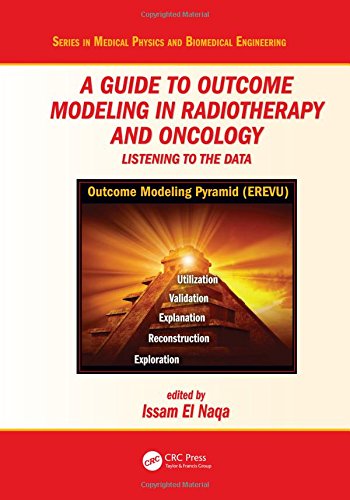راهنمای مدل سازی نتیجه در رادیوتراپی و انکولوژی: گوش دادن به داده ها ۲۰۱۸
A Guide to Outcome Modeling in Radiotherapy and Oncology: Listening to the Data 2018
دانلود کتاب راهنمای مدل سازی نتیجه در رادیوتراپی و انکولوژی: گوش دادن به داده ها ۲۰۱۸ (A Guide to Outcome Modeling in Radiotherapy and Oncology: Listening to the Data 2018) با لینک مستقیم و فرمت pdf (پی دی اف)
| نویسنده |
Issam El Naqa |
|---|
| تعداد صفحهها |
368 |
|---|---|
| نوع فایل |
|
| حجم |
11 Mb |
| سال انتشار |
2018 |
89,000 تومان
معرفی کتاب راهنمای مدل سازی نتیجه در رادیوتراپی و انکولوژی: گوش دادن به داده ها ۲۰۱۸
این کتاب مدل سازی پیامد در سرطان را از دیدگاه داده محور بررسی می کند تا درک بهتری از پاسخ درمانی پیچیده، هدایت طراحی آزمایش های بالینی پیشرفته، و کمک به مراقبت شخصی از بیمار و بهبود کیفیت زندگی آن ها را امکان پذیر سازد. این شامل پوششی از منابع داده مربوطه در دسترس برای ساخت مدل (پانومیک)، از منابع بالینی یا پیش بالینی گرفته تا ویژگی های اساسی بیمار و درمان، تصویربرداری پزشکی (رادیولوژی) و بیومارکرهای مولکولی مانند موارد مرتبط با ژنومیک، پروتئومیکس و متابولیسم است. همچنین شامل بحث در مورد روش های مختلف برای ساخت مدل های پیش بینی با استفاده از رویکردهای تحلیلی و داده محور است.
این کتاب در درجه اول به عنوان یک راهنمای یادگیری برای تازه واردان به مدل سازی نتایج در نظر گرفته شده است، زیرا شامل دستور العمل های عمیق در مورد هنر مدل سازی و ارائه راهنمایی های فراوان است. چگونه می توان چنین مدل هایی را به واقعیت نزدیک کرد.پزشک و زیست شناس برای درمان بالینی. این کتاب همچنین برای پزشکان باتجربه به عنوان مرجعی در مورد جنبه های مختلف مدل سازی نتیجه و کاربردهای فعلی آنها ارزشمند خواهد بود.
ویژگی ها:
- از بالا به پایین را پوشش می دهد که از تجزیه و تحلیل داده های بزرگ، آمار، یادگیری ماشین و از پایین به بالا با استفاده از اصول اول و تکنیک های چند مقیاسی، از جمله شبیه سازی های عددی مبتنی بر تکنیک های مونت کارلو و خودکارها
- نمای کلی از ابزارها و منابع نرم افزاری موجود برای توسعه و ارزیابی مدل های نتیجه را ارائه می دهد، و شامل مثال های عملی مفصل در سراسر کشور است. li>
- انواع برنامه های کاربردی محبوب را برای مدل سازی نتایج در مقیاس در زمینه های مختلف ارائه می دهد: برنامه ریزی درمان در رادیوتراپی، شیمی درمانی و ایمونوتراپی، کاربردهای کاربردی و مبتنی بر نشانگرهای زیستی، مدل سازی ذرات درمانی، جراحی انکولوژیک، طراحی کارآزمایی بالینی تطبیقی و SMART li>
This book explores outcome modeling in cancer from a data-centric perspective to enable a better understanding of complex treatment response, to guide the design of advanced clinical trials, and to aid personalized patient care and improve their quality of life. It contains coverage of the relevant data sources available for model construction (panomics), ranging from clinical or preclinical resources to basic patient and treatment characteristics, medical imaging (radiomics), and molecular biological markers such as those involved in genomics, proteomics and metabolomics. It also includes discussions on the varying methodologies for predictive model building with analytical and data-driven approaches.
This book is primarily intended to act as a tutorial for newcomers to the field of outcome modeling, as it includes in-depth how-to recipes on modeling artistry while providing sufficient instruction on how such models can approximate the physical and biological realities of clinical treatment. The book will also be of value to seasoned practitioners as a reference on the varying aspects of outcome modeling and their current applications.
Features:
- Covers top-down approaches applying statistical, machine learning, and big data analytics and bottom-up approaches using first principles and multi-scale techniques, including numerical simulations based on Monte Carlo and automata techniques
- Provides an overview of the available software tools and resources for outcome model development and evaluation, and includes hands-on detailed examples throughout
- Presents a diverse selection of the common applications of outcome modeling in a wide variety of areas: treatment planning in radiotherapy, chemotherapy and immunotherapy, utility-based and biomarker applications, particle therapy modeling, oncological surgery, and the design of adaptive and SMART clinical trials



